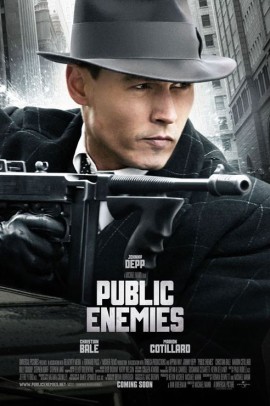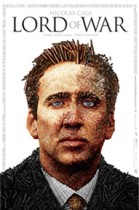Public Enemies (2009)
Synopsis
Would you rather be a charming and vibrant criminal who never uses his guns, or a boring and blunt law enforcement officer? That is the choice presented to us in this gangster drama. John Dillinger is a successful bank robber who shares a sense of brotherhood with his friends and attracts a gorgeous woman into his life. What more could a man ask for? This is a story about the importance of putting your morality first and of recognizing that without integrating our most basic drives we have no fuel to move forward.

| Genre | Thriller |
| Production year | 2009 |
| Director | Michael Mann |
| Male actors | Johnny Depp, Christian Bale, Billy Crudup |
Integrate the lower to unleash the higher
by Pelle Billing
Set in the 1930s, Public Enemies tells the true story of the last few years of gangster and serial bank robber John Dillinger. Initially, we’re shown how successful Dillinger is at his profession, robbing banks seemingly effortlessly in Chicago, and being largely protected from the authorities through his influence and connections in the world of organized crime. He also seems to have the personality to go with such a lifestyle, being charismatic, carefree and almost sympathetic in spite of his line of work. While he doesn’t have much regard for the law, he always refrains from killing people when performing his robberies.
Charm vs Morality
At a restaurant, Dillinger meets the love of his life, the singer Billie Frechette. Even though she soon realizes that he’s on the wrong side of the law, she has already fallen for him. Dillinger’s confidence and charisma pull the attractive singer into his life, even as he lacks qualities such as having a higher purpose or coherent moral code. Dillinger also has an air about him which is free from the stiffness so common in many other men, especially in this era, and he has no trouble dancing with a woman or authentically complimenting her.
So what does Dillinger’s relationship with Billie Frechette teach us? That good instincts and self-esteem are more important than our moral code and having a positive impact on the world? Of course not. All of these qualities can be important, but most of us would agree that a basic moral code is the starting point for being a decent human being. At the same time, we don’t have to choose between our lower and higher parts; we can have both.
What Dillinger’s positive qualities demonstrate more than anything is that reintegrating the instinctual and emotional side of your being is crucial, if you want to become a man with full access to yourself and your potential. Healing and integrating the lower parts of yourself will supercharge your higher parts and provide you with the energy needed to achieve the positive impact on the world that you know is possible. On the other hand, having access to our lower parts while having little access to our higher parts can be a recipe for disaster, as shown by the unfolding of Dillinger’s story.
Masculine Culture and Violence
The casual lifestyle of our criminal protagonist changes abruptly when J. Edgar Hoover, head of the newly formed FBI, decides that Dillinger is a public enemy who is to be tracked down and incarcerated. The FBI presents a new type of authority in Dillinger’s world; one that cannot be bribed or controlled by having powerful connections in the world of organized crime.
Consequently, from this point on Dillinger is a hunted man, and the person in charge of the manhunt is FBI agent Melvis Purvis, an ambitious and talented agent who will stop at nothing to achieve his goal. With him he has a crew of young men who are eager to prove themselves within this new organization; young men who have been taught that a man is supposed to follow the law and use his power to protect people.
Dillinger is in some ways a person who evokes a lot of sympathy. He avoids killing people, he has a good sense of humor and he is loyal to his friends. There is also a vulnerability in him and you can sense that he is more connected to his heart than many of the law-abiding men chasing him. However, at the end of the day he is still a criminal and this very fact causes violence and gets people killed.
At one point in the story when Dillinger and his gang are on the run after a bank robbery, FBI agent Purvis and his companions manage to track them down to a hotel. The resulting shootout leads to the death of several innocent civilians who never would have died had it not been for the actions of our charismatic protagonist and his fellow bank robbers. So while Dillinger is likely too kind-hearted to kill civilians in cold blood himself, the actions that stem from his crimes lead to the loss of innocent lives.
In many ways, the masculine culture of today originally arose as a response to men such as Dillinger. As demonstrated by the creation of the FBI, a key aspect of masculine culture is about controlling random violence by using precise force and power where it is needed. This is not to say that there aren’t any problems with law enforcement or masculine culture; there are plenty.
But most people intuitively understand that controlling people such as Dillinger, who will not adapt to the basic rules needed to build a peaceful society, is an absolute necessity. On a personal level, Dillinger may be kinder and more personable than the stiff FBI agents chasing him, but on an impersonal, societal level he is a constant threat to his fellow citizens.
Raising Boys
All people are born with the potential to have an impact on the world. The positive side of masculine culture has always been about older men teaching younger men to use their inner resources and potential for constructive purposes, whether in a tribe, at a farm or at a modern day soccer practise.
Our instinctual and emotional parts are with us from the day we are born, but what has been passed on from caring fathers to their sons throughout history is the morality, the higher parts, that ultimately turn us into mature men. Violence has decreased significantly since the dawn of humanity, and older men teaching younger men about boundaries and ethics has significantly contributed to this.
Dillinger is in many ways the quintessential example of a man who is still a boy. Archetypally, he combines the eternal boyhood inherent in the Peter Pan archetype with the lawlessness of the Gangster archetype. For some reason he has resisted growing up and becoming a man who cares about ethics and the lives of others. Perhaps this is due to growing up with a lack of healthy boundaries. Perhaps it comes from rebelling against a father father figure who was overly strict and didn’t show him much love. Regardless of his background, it is evident that he hasn’t been surrounded by the conditions needed to help a boy grow into a mature man.
At the same time, what we often see happening in boys as they grow into men, is that they lose access to their instinctual and emotional parts. They lose the embodiment of the life force and charm so evident in Dillinger. The societal expectations for men to be good providers and protectors, in combination with the unhealthy aspects of masculine culture, far too often mean that boys are socialized to lose touch with their instincts and emotions.
We certainly do not want boys to turn out like Dillinger, but by raising boys with a mixture of love and boundaries, we can give them access to all of themselves in a healthy and constructive way. Our instincts and emotions are not something to be feared, but something that we can heal and integrate even as adult men.
There is a third way between what Dillinger embodies and what the stiff FBI agents chasing him embody. That third way is the future.
Powerful ideas from Public Enemies
- Morality is more important than charisma.
- Don’t settle for either charisma or morality, claim both domains by integrating your animalistic drives.
- Violence is inherent, masculine culture aims to curb it.
- Masculine culture may be imperfect and sometimes overly strict, but it’s better to reform it than to throw it out the window.
- Invite men whom you trust into your life, if you are serious about your growth as a man.


